calsfoundation@cals.org
Central Delta Depot Museum
The Central Delta Depot Museum in Brinkley (Monroe County) is an initiative of the Central Delta Historical Society, which was organized in the 1990s to preserve the history and heritage of the central Delta area. The museum’s scope covers all of Monroe and parts of Woodruff, St. Francis, Prairie, Lee, Phillips, and Arkansas counties.
Louise Mitchell, a Kingsland (Cleveland County) native who had taught at Brinkley High School, served as the first president of the Central Delta Historical Society and editor of its journal from 1997 to 2001. In 1999, she led a letter-writing campaign—directed to Union Pacific officials, President Bill Clinton, the area’s congressmen, and others—to save Brinkley’s Union Train Station from destruction so a museum could be established.
Brinkley, located midway between Memphis, Tennessee, and Little Rock (Pulaski County), was ideally situated at the crossing of the Memphis and Little Rock Railroad (later the Rock Island)—the state’s first rail line (completed in 1871)—and the Texas and St. Louis Railroad (later the Cotton Belt), which was laid through the city in 1882. With two other rail lines coming in from the north and south, the city rapidly became a regional shipping center for cotton and timber products and a major point of transfer for rail passengers in the nineteenth and early twentieth centuries. The brick train station originally opened on September 16, 1912, and was constructed at a cost of $25,000. Its wing design and size, with freight rooms at each end of the building, made it the most striking of the Rock Island stations between Memphis and Little Rock. Passenger service ceased on the Cotton Belt in 1959 and the Rock Island line in 1967. Because of the bankruptcy of the Rock Island, the train station was closed in 1980. Union Pacific took over operations of the Cotton Belt line and that part of the Rock Island between Memphis and Little Rock.
In February 2001, Union Pacific deeded the station to the city of Brinkley, which later gave a long-term lease for it to the Central Delta Historical Society. The groundbreaking ceremony for the restoration of the depot was held May 4, 2001. Welch Construction Company of Benton (Saline County) had the general contract, and work was completed in 2003. The museum opened in May of that year.
The Central Delta Depot Museum is a museum of general history, with an emphasis on the stories of the Rock Island and Cotton Belt rail lines that crossed at Brinkley. The museum gets some support from the city of Brinkley but otherwise depends on admission charges, donations, fundraisers, and grants to finance its operation.
On the museum grounds is the approximately 100-year-old frame depot that at one time was located at Monroe (Monroe County) on the Missouri Pacific rail line that connected Brinkley to Helena (Phillips County). Still another rail line, the White and Black River Railroad (owned in later years by Rock Island), provided service from Brinkley to Jacksonport (Jackson County).
Other features of the museum are the furnished tenant farm house and the Southern Pacific caboose built in the 1980s, one of seventy-five ordered by the company, the last purchase they made of that car. The museum also features photographs and exhibits on Brinkley native and blues musician Louis Jordan, as well as a collection of his early 78 r.p.m. records.
The museum serves as the visitors’ center for the Louisiana Purchase Historic State Park, located just off Highway 49, about twenty miles south of Brinkley. The Choo Choo Ch’Boogie Delta Music Festival is held on the grounds of the museum each spring.
For additional information:
Central Delta Depot Museum. Arkansas Department of Parks and Tourism. https://www.arkansas.com/brinkley/attractions-culture/central-delta-depot-museum (accessed August 31, 2023).
Mitchell, Steve and Kenneth Story. “Lick Skillet Railroad Work Station Historic District.” National Register of Historic Places registration form. On file at Arkansas Historic Preservation Program, Little Rock, Arkansas. Online at https://www.arkansasheritage.com/docs/default-source/national-registry/mo0127-pdf.pdf?sfvrsn=9a1fef8b_0 (accessed August 31, 2023).
Schnedler, Jack. “Treasuring ‘Train Town.'” Arkansas Democrat-Gazette, October 29, 2024, pp. 1E, 6E. Online at https://www.arkansasonline.com/news/2024/oct/28/arkansas-sightseeing-central-delta-depot-museum/ (accessed October 29, 2024).
Bill Sayger
Biscoe, Arkansas

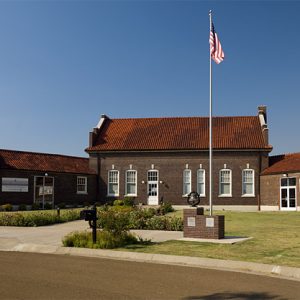

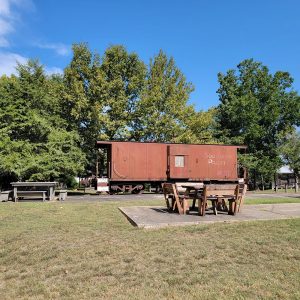
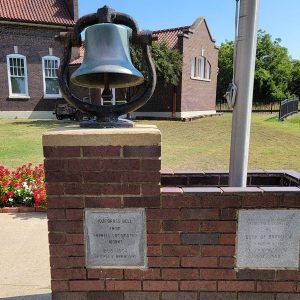
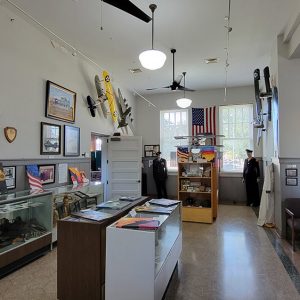
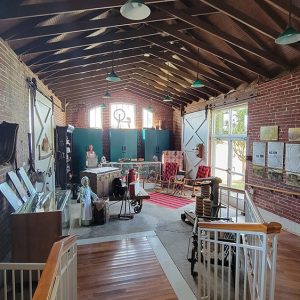

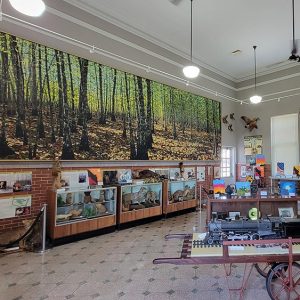





Cotton Belt passenger service ended on November 30, 1959, and Rock Island passenger service ended eight years later, on November 10, 1967. Rock Island and Cotton Belt jointly maintained a freight agent in the depot until the Rock Island bankruptcy in March 1980. Cotton Belt continued to staff the station for several years thereafter before closing the building. Cotton Belt, and later Union Pacific, purchased Rock Island trackage eastward from Brinkley to Memphis, but Rock Island trackage west from Brinkley to North Little Rock (along the north side of the depot) was abandoned and subsequently removed in the mid-1980s.